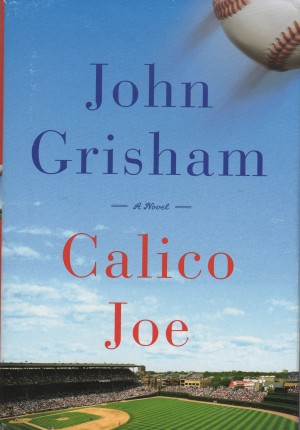Calico Joe by John Grisham (2012. Doubleday. ISBN 978-0-385-53607-3)
Today’s statistics: Laman’s River by Mark Munger ranks 1,648,432nd on Amazon.com. Calico Joe by John Grisham ranks 1,198th. There’s little reason for a modest (in terms of sales, not ego) regional writer like me to pick a fight with one of America’s best selling and most widely read novelists. But, I did it with my review of Grisham’s short story collection, Ford County (see above under “Reviews” tab and the subtab, “Books”) so, what the hell. I might as well have my say.
First off, if you aren’t a baseball fan, you might not like this book. I’m gleaning this from the other reviews posted at Amazon.com. Many of the one star ratings posted there are from folks who don’t like or appreciate America’s pastime. Quite frankly, I am puzzled why someone would buy this book if that’s the case. There may be things to criticize about this slender bit of fiction but false advertising isn’t one of them. Grisham tells you, Doubleday tells you, that this is a story about baseball and not the legal system. So complaining about the subject matter makes little sense. Besides, what better way to spend a hot summer Sunday afternoon (which is what I did yesterday) than reading a novel about baseball?
Well, here are the problems as I see it. First off, this isn’t a novel at all. Using basic math, counting the words on a page of this anorexic tome and multiplying that by the 198 pages of the book, I count 40,000 words to the story, give or take. To me, that’s a novella, not a novel. So, to be honest, Doubleday and the author should have included this story as the centerpiece of a short fiction collection and not charged $16.00 for this mislabeled novel on its own. But, as I said, having read Ford County and not been impressed, and knowing that, even for top shelf fiction authors like Grisham, short fiction collections always fall short of corporate sales expectations, maybe that’s why my latest book is where it is on the charts and why Calico Joe is where it is: The folks at Doubleday and Mr. Grisham are a hell of a lot smarter than me when it comes to marketing.
The second deficit with the book is the writing itself. Not unlike a novel I just read for my position with the Rural Lit R.A.L.L.Y., Country People by Ruth Suckrow, Calico Joe reads like a young adult book and not like a story for mature audiences. I’m not talking about sex or lust or violence or other adult themes here: I’m talking about the overall quality and sophistication of the prose. Grisham has always been a relatively simple storyteller. He uses ordinary phrasing, punctuated with regional references from the South in many of his tales, to great effect. Hemingway was similar in that he rarely resorted to wordsmithery (hope that’s a word!) when crafting a story: He used common, everyday prose in a way that was unique, entertaining, and revelatory. But the writing in Calico Joe is simply too bland, too uninteresting, to rise to that same level of quality. Simple is better unless it’s just simple.
Then there’s the plot and the characters. In a story as truncated as this, we don’t learn a whole hell of a lot about the main character of the story, broken down major league pitcher Warren Tracey except that he’s a bastard. To his wife. To his kids. To his teammates. To opposing players. Creating a villain with only one dimension to his character is tiring after a few pages. There’s no nuance, no tension between the good and the evil that lies in the heart of every man, be he St. Paul or Hitler. And without that tension, any story of redemption will fall flat. Here, the author gives us little reason to believe in Warren’s “come-to-Jesus” awakening because:
1. There were no glimpses of such a conversion displayed earlier in the book; and
2. The change in the bad guy takes place with little, if any, explanation as to why Warren tries to make amends.
Then there’s Joe Castle, the ultimate target of Warren’s nastiness. Again, because of the juvenile level of the prose used to tell this tale, there’s precious little revealed about Joe as a human being. Oh sure, we know he’s a fantastic baseball player, probably the best hitter baseball has seen since Ty Cobb. But we learn nothing beyond this about Calico Joe. Couple this lack of depth to the tale’s “hero” with the implausibility of the statistics the author attaches to the young man’s major league debut and you have, as I said, a fine young adult morality play but little else.
Finally, the ending. I won’t go too deep into it here so as not to spoil it all for those of you who, despite this review, simply must read the book. Suffice it to say, the predictability factor to the book’s conclusion is extremely high.
I haven’t been satisfied with Grisham’s writing since he penned An Innocent Man in 2006. That’s when he took on a nonfiction project, the railroading of a broken down ex-ballplayer for the rape and murder of a cocktail waitress he didn’t commit. That book was a masterful bit of storytelling and Grisham proved, as he did with his literary novel, A Painted House, that he is an American writer of note beyond the legal thrillers that made him famous. Rather than waste your money on Calico Joe, I’d urge you to pick up a copy of An Innocent Man which was just re-released in paperback.
My next project? To read Grisham’s Bleachers and close the last page of the book with a smile on my face. We shall see.
2 and 1/2 stars out of 5.



